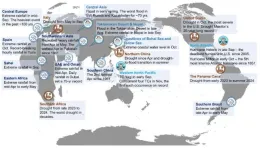Circulating tumour DNA (ctDNA) is fragments of DNA released into the blood by tumours. It’s known to be important for disease prognosis but can be difficult to measure precisely.
In research published today in Nature Medicine, Crick and UCL scientists worked with Personalis to test a platform called NeXT Personal, which can detect very small amounts – 1 part per million – of ctDNA. This builds on the Crick team’s discovery of signals in the blood that detect cancer cells after treatment, which could indicate a potential for relapse.
They applied the platform to blood plasma samples from 171 people with early-stage lung cancer in the TRACERx cohort, finding that people with a low level of ctDNA before surgery were less likely to relapse and had improved overall survival rates than people with a high level of ctDNA1.
The high sensitivity of the test meant that smaller amounts of ctDNA could be detected, which prevented people with a lower amount of ctDNA from being incorrectly labelled ctDNA negative2.
Early-stage lung cancer is usually treated by removing the tumour by surgery and with chemotherapy or immunotherapy, depending on the stage of the tumour, which aims to achieve the highest chance of cure.
The test will next be assessed on samples from patients that have undergone surgery with the earliest stages of lung cancer, to evaluate if the presence of ctDNA post-operatively in blood can be used to infer future risk of relapse. This could allow doctors to offer additional therapy after surgery, increasing the chance of curing patients.
James Black, Postdoctoral Clinical Fellow at the Francis Crick Institute and the CRUK Lung Cancer Centre of Excellence at UCL, said: “We’ve shown that the presence or absence of tumour DNA in the blood was strongly predictive of prognosis. ctDNA testing, especially using ultrasensitive platforms, could help clinicians make more informed decisions about treatment and give patients a more accurate idea of how their disease might progress. More research to validate these tests will help to get them on the agenda for regular clinical use.”
Charles Swanton, Deputy Clinical Director and Head of the Cancer Evolution and Genome Instability Laboratory at the Crick, medical oncologist at University College London Hospitals, Chair in Personalised Cancer Medicine at the UCL Cancer Institute, Chief Investigator for TRACERx, and senior author of the study, said: “Lung cancer is one of the most common types of cancer in the UK, but it’s hard to treat with a high relapse rate. It’s vital to understand who would benefit from more aggressive treatment, especially for patients with Stage 1 disease who are often diagnosed during CT screening for those at a higher risk. Using sensitive ctDNA tests is one way to do this, which we hope will maximise clinical benefit and minimise unnecessary treatment for individual patients.”
Richard Chen, Chief Medical Officer and Executive Vice President of R&D at Personalis, said: “We designed NeXT Personal to detect residual or recurrent cancer in its earliest stages, and this study shows the clinical importance of that ultra-sensitive detection in early-stage lung cancer. A more sensitive test like NeXT Personal offers the potential of earlier detection and earlier treatment for patients. Similarly, as we see in this study, a negative test can potentially reassure patients, and offer the hope of avoiding unnecessary therapy in the future."
Marianne Baker, Research Information Manager at Cancer Research UK, said: "TRACERx is our flagship lung cancer research study, tracking the disease’s evolution over time. As a hard-to-treat cancer, the more we understand about its progression, the better equipped we are to beat it.
"The kind of test used in NeXT Personal can help us move toward an age of personalised medicine, ensuring clinicians can get the right treatment to the right people by accurately sorting them into groups based on what their disease is likely to do. The test can help to improve quality of life and survival by ensuring clinicians can go all-in for people whose disease is more likely to come back after treatment, while sparing people difficult treatments they might not need if their disease is less risky.
"More research is needed, but the study takes us a step closer to a day where treatments can be tailored to patients. The next chapter in TRACERx, TRACERx EVO, is now recruiting people to join the study and will be looking even deeper into the biology of lung cancer."
The study is supported by the National Institute for Health and Care Research UCLH Biomedical Research Centre.
-ENDS-
For further information, contact: press@crick.ac.uk or +44 (0)20 3796 5252
Notes to Editors
Reference: Black, J. et al. (2025). Ultrasensitive ctDNA detection for preoperative disease stratification in early-stage lung adenocarcinoma. Nature Medicine. 10.1038/s41591-024-03216-y.
Pre-surgery ctDNA negative status was associated with significantly improved overall survival rates – 100% survived within 5 years, compared to 48.8% of those with a high (above-average) level of ctDNA.
The presence of ctDNA at levels below 80 parts per million remained prognostic for poor outcomes, suggesting that a clinically meaningful signal is missed by less sensitive tests that can’t detect ctDNA below 80 parts per million.
About The Francis Crick Institute
The Francis Crick Institute is a biomedical discovery institute dedicated to understanding the fundamental biology underlying health and disease. Its work is helping to understand why disease develops and to translate discoveries into new ways to prevent, diagnose and treat illnesses such as cancer, heart disease, stroke, infections, and neurodegenerative diseases.
An independent organisation, its founding partners are the Medical Research Council (MRC), Cancer Research UK, Wellcome, UCL (University College London), Imperial College London and King’s College London.
The Crick was formed in 2015, and in 2016 it moved into a brand new state-of-the-art building in central London which brings together 1500 scientists and support staff working collaboratively across disciplines, making it the biggest biomedical research facility under a single roof in Europe.
http://crick.ac.uk/
About Personalis, Inc.
At Personalis, we are transforming the active management of cancer through breakthrough personalized testing. We aim to drive a new paradigm for cancer management, guiding care from biopsy through the life of the patient. Our highly sensitive assays combine tumor-and-normal profiling with proprietary algorithms to deliver advanced insights even as cancer evolves over time. Our products are designed to detect minimal residual disease (MRD) and recurrence at the earliest timepoints, enable selection of targeted therapies based on ultra-comprehensive genomic profiling, and enhance biomarker strategy for drug development. Personalis is based in Fremont, California. To learn more, visit www.personalis.com and connect with us on LinkedIn and Twitter.
END



